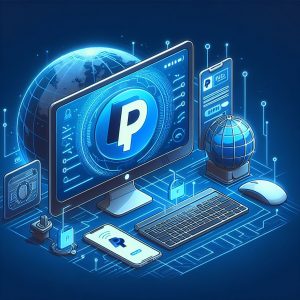I. Introduction
A virtual private network (VPN) is an essential online privacy and security tool that encrypts internet traffic and masks your IP address and online identity. PayPal is a popular online payment processor used by millions worldwide.
Many VPN services accept payment through traditional credit cards and PayPal for subscription plans. However, using PayPal does introduce a conflict with the VPN goal of preserving complete anonymity. This guide will explore methods for keeping your financial identity secure when paying for VPN service using PayPal or alternative anonymous crypto payment options.

II. Creating a Stealth PayPal Account
The first step towards privacy when purchasing a VPN plan through PayPal is creating a “burner” stealth account not tied to your real identity:
- Use a new email address from a secure provider like ProtonMail or Tutanota rather than Gmail. Ideally create one while connected to a trusted VPN for additional anonymity.
- When creating your stealth PayPal account, avoid inputting any personal details like real name, address or date of birth during sign up.
- For added security, you can further anonymize connections to PayPal by signing up and accessing the burner account exclusively through a trust VPN or Tor browser to mask your IP.
By logging into this stealth PayPal account from random public Wi-Fi networks, even PayPal itself cannot easily trace back to your true identity. Now you have an anonymous payment method to safely fund VPN services without revealing financial and purchase history.
III. Your Own Outline VPN Server
Rather than exposing payment details to a third party VPN provider, another option is creating your own private VPN server for secure traffic tunneling. This offers unmatched privacy since you control the hosting infrastructure:
Benefits:
- No usage or financial data handed to external services
- Scale server resources matching personal connection needs
- Choose from thousands of global IP endpoints to reveal location
- Invite only access guarantees capacity for your devices
Sounds great, but is running your own VPN server realistic for average consumers? In short – yes! Services like Outline and Streisand make easy self-hosting home VPN access cheaper than ever:
Outline Manager Created by Jigsaw – Alphabet’s technology incubator – Outline provides open source tools for rapidly deploying personal VPN infrastructure. Requirements:
- Cloud server account like DigitalOcean ($5/mo basic VPS)
- Domain name for custom URL and SSL encryption
- Outline Manager software installed on your device
That handles the heavy lifting configuring secure Shadowsocks connections, custom plugins and domain/SSL features you manage through simple Outline apps linking Windows, Mac, iOS or Android. Cost equals any economic VPS provider plus $10-15 annually averaging most domains.
With server and client software handling encryption automatically, you get convenience of typical VPN provider but with the personalized password and DNS controlled advantages.
Advanced technical skills are not a barrier either following detailed Outline deployment guides. For less than $100 yearly you can route internet activity across a private, uncapped server without relying any VPN middlemen.

IV. Paying for VPN Anonymously
If opting for a commercial VPN provider rather than self-hosted, certain precautions are necessary keeping payment details private:
Methods:
- Buy VPN gift cards from Amazon, BestBuy using cash. Redeem card codes to pay anonymously.
- Rotating virtual debit cards like Privacy.com to fund accounts avoids real bank info.
But exercise caution – many VPN provider terms of service strictly forbid using gift cards or virtual credit cards. Subscriptions may be cancelled if alternate funding detected. So first read service policies before pursuing grey area payment tactics some classify as fraud.
Better yet embrace legit direct anonymous options next.
Is PayPal Safe for VPN?
PayPal is not ideal but unavoidably necessary for many VPN subscribers. All reputable services like ExpressVPN and NordVPN accept PayPal alongside traditional payment processors like Visa and MasterCard.
While not fully anonymous, well rated VPNs gaining mainstream traction do take steps protecting user data like:
- No activity/usage logs detailing sites visited
- No IP address leakages
- No session timestamps tracked
So beyond financial history, PayPal VPN payments reveal limited identifying information thanks to no monitoring usage or traffic. For maximum privacy however, the crypto method below is recommended.
V. Paying for VPN with Cryptocurrency
VPN veterans acknowledge cryptocurrency as the truly anonymous VPN payment method offering full confidentiality:
- Major coins like Bitcoin, Ethereum or Monero transfers reveal no personal financial data
- Crypto purchases available from leading VPNs like CyberGhost, Surfshark
- Some niche VPNs dealing crypto exclusively like BlufVPN
Transaction flows for funding a VPN subscription by crypto:
- Acquire cryptocurrency from exchange like Coinbase
- Send coins to VPN provider issued wallet address
- VPN account reflects paid status allowing secure connections
Each month additional coins sent extend subscription without relying banks or middlemen processors tracking activities. Just be cautious holding large crypto balances as exchange hack history confirms.
Instead only keeping minimal coins in hot wallets needed for planned monthly VPN payments makes the safer bet. And investigate VPN refund policies before purchasing multi-year deals upfront in cryptocurrency.

VI. Conclusion
I hope this piece covered all considerations around incorporating VPN usage with PayPal accounts plus alternate solutions maximizing privacy. While PayPal itself certainly works paying for top VPN services, take a few easy precautions like setup burner accounts for true anonymity.
Or for the ultimate confidentiality, deploy your own VPN server through simplified tools like Outline putting you fully control. And leveraging the blockchain power behind cryptocurrencies enables a VPN funding avenue no company or government can block – ideal for getting around restricted environments.
Whichever method you pursue ensuring secure VPN access, take the initiative learning self-hosting principles or how emerging crypto technologies interface with encrypted tunnels. This puts power back in your hands rather relying oversight by corporate VPN entities or payment processors holding data.
Take the first step towards a more private internet experience on your own terms. Reach out with any questions arising implementing recommended steps outlined above!